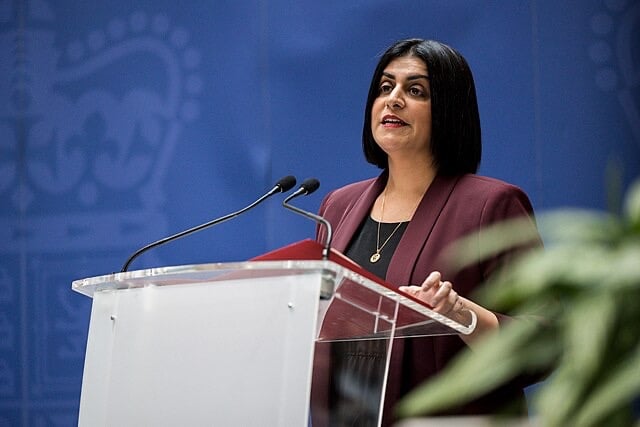Shabana Mahmood suggests some demonstrators do not genuinely seek peace as Government prepares tougher restrictions on repeated protests
The Home Secretary has cast doubt on whether all pro-Palestinian protesters genuinely desire peace in the Middle East, following continued demonstrations after President Donald Trump declared the war in Gaza “over” earlier this week.
Shabana Mahmood told the House of Commons that protests had persisted both before and after the peace agreement, leading her to conclude that not all demonstrators truly wished to see peace in the region. The remarks came as the Government confirmed plans to introduce stricter powers that could allow authorities to ban demonstrations entirely.
President Trump announced on 8th October that Israel and Hamas had agreed to the first phase of a peace framework, with the US leader declaring during a visit to Israel this week that the conflict had ended. The agreement includes the release of Israeli hostages, withdrawal of troops to agreed positions, and the exchange of Palestinian prisoners.
New Protest Powers to Consider “Cumulative Impact”
In a statement to Parliament, Ms Mahmood revealed that sections 12 and 14 of the Public Order Act 1986 would be amended to allow police officers to consider the cumulative impact of frequent protests when deciding whether to enforce conditions such as changes to routes or timings.
The Home Secretary defended the balance between fundamental freedoms and public safety. She stated that whilst the right to protest remained a fundamental freedom enjoyed by people of all backgrounds, it had to be balanced against the right for all people to live in safety.
Her announcement followed a wave of pro-Palestine demonstrations which she previously said had created considerable fear among Jewish communities. One London event saw 488 arrests for supporting Palestine Action, which has been designated as a terrorist organisation by the Government.
Parliamentary Opposition and Debate
The proposed measures drew criticism from opposition benches. Liberal Democrat home affairs spokesman Max Wilkinson warned that Government decisions had led to police arresting pensioners for holding cardboard signs when resources should be protecting communities, including the Jewish community, from those who would cause harm.
Mr Wilkinson argued the approach undermined the right to protest and diverted police resources from genuine protection work.
The Home Secretary responded forcefully, challenging the Liberal Democrats to clarify their position on the rule of law. She stated it was perfectly legitimate to debate terror laws in Parliament and outside, but supporting a proscribed organisation remained a crime under the law of the land.
Green Party Westminster leader Ellie Chowns expressed concern about further restrictions on protest, asking the Home Secretary to ensure every policy measure focused on building solidarity between communities and countering division. Ms Mahmood replied that a balance must be struck between freedoms, acknowledging she believed it was currently in the wrong place.
Cost and Enforcement Concerns
Conservative MP for Harrow East Bob Blackman warned that Londoners were fed up paying for what he termed hate marches and hate demonstrations to take place. He suggested organisers should bear the bill for the policing costs of their demonstrations.
Ms Mahmood confirmed she was considering all recommendations from advisers, including proposals about policing costs.
Palestine Action Proscription Remains Contentious
Palestine Action was proscribed as a terrorist organisation on 5th July 2025 under the Terrorism Act 2000, following a security breach at RAF Brize Norton where members vandalised Royal Air Force aircraft. The decision has proved highly controversial.
Since the proscription, British police have arrested at least 1,601 individuals for showing support to Palestine Action, with many arrests resulting from sit-ins on Parliament Square in August and September. Civil liberties groups have criticised the ban as conflating protest with terrorism.
UN Human Rights Chief Volker Türk urged the UK Government to rescind its decision to proscribe Palestine Action, warning that counter-terrorism laws were being applied to conduct that is not terrorist in nature.
The organisation, founded in 2020, has conducted direct action campaigns against arms manufacturers and facilities it accuses of complicity in Israel’s military operations. Its tactics typically involve property damage and occupation of sites.
Government Stance on Extremism
Ms Mahmood pledged the Government would not shy away from tackling Islamist extremism, committing to doing everything in its power to stand up to this threat without fear or favour.
She noted that Islamists often suppress, hurt and damage their fellow Muslims, making it in everyone’s interests to fight Islamist extremism wherever found.
The Home Secretary’s previous comments about some protests being fundamentally un-British in nature followed demonstrations that occurred hours after a terrorist attack in Manchester. She had appealed to organisers to cancel marches, asking protesters to take a step back and imagine the feelings of those who had lost loved ones in horrifying terrorist attacks.
What the Legislation Means
Section 12 of the Public Order Act 1986 provides police the power to impose conditions on processions to prevent serious public disorder, serious criminal damage or serious disruption to the life of the community. Section 14 provides similar powers for imposing conditions on static assemblies.
The proposed amendments would allow officers to take account of previous protest activity when setting restrictions, meaning repeated demonstrations at the same location could face tighter conditions or alternative venues.
The changes represent the Government’s latest attempt to manage what it describes as disruptive protest activity, following measures introduced in the Police, Crime, Sentencing and Courts Act 2022 and the Public Order Act 2023.
Follow for more updates on Britannia Daily
Image Credit:
Home Secretary Shabana Mahmood — photo by UK Government / No 10 Downing Street, licensed under the UK Open Government Licence v3.0



